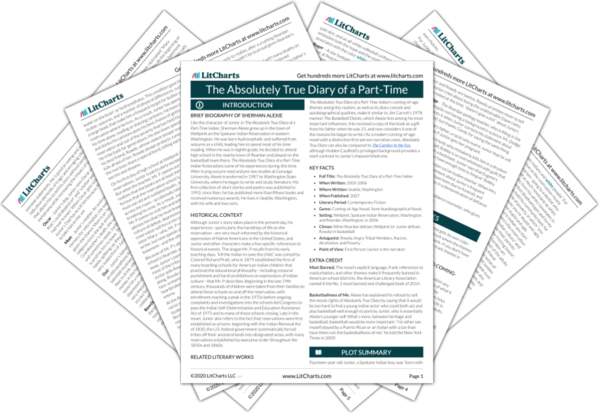Summary
Analysis
At the end of the school year, Junior goes to the cemetery with his mom and dad to clean the graves of Grandmother Spirit, Eugene, and Mary. They make it a day of celebration, with a picnic and Dad’s saxophone. Junior’s parents kiss and hold hands, the family hugs, and Junior’s mom says she is proud of him. Junior reflects that “in the middle of a crazy and drunk life, you have to hang on to the good and sober moments tightly.”
Just like they do at Grandmother’s funeral, Junior’s family finds a way to make their visit to the cemetery a joyous occasion. The scene illustrates the close family relationships that have supported Junior throughout his difficult year and will likely continue to anchor him to his tribe, even after he leaves the reservation.
Themes
Thinking of how Mary died while attempting to find her dreams—and how he is making the same attempt, even if it kills him too—Junior begins to cry for his sister, himself, and his tribe. He wishes everyone could “get strong and get sober and get the hell off the rez,” but knows he is the only one “brave and crazy enough … with enough arrogance.”
Despite his past experiences with bullying and his low self-esteem at the beginning of the novel, Junior has a strong belief in his own exceptionalism. This might be partly a result of his being an outsider—after a long time feeling like “the only one” in various contexts, he’s learned to take pride in his differences and use them to his advantage.
Themes
In the midst of his tears, Junior has a huge realization: that he will never drink and never kill himself, but will leave the reservation and make a better life for himself; that this will make him lonely, but that he will not be alone in his loneliness; that he is a member of many “tribes” in addition to being a Spokane Indian, such as the tribe of cartoonists and the tribe of poverty and the tribe of chronic masturbators; and that all this means that he is going to be okay.
Junior’s revelation begins and ends with the idea that he’s in control of his own life: he won’t drink and he won’t kill himself, because he can choose not to. He also realizes that he can form a connection with others based on almost anything—in other words, he’ll never not belong to a tribe—and that membership in one “tribe” doesn’t negate his membership in another. This is a significant change from the beginning of the book, when he believed he was weak and powerless and had a very black-and-white view of the world. This climactic moment marks Junior’s true coming-of-age, as he is now ready to make his own way in the world and has the maturity to navigate its complexities.
Themes
However, it also makes Junior think of people who are not going to be okay—including Rowdy, whom he desperately misses and wants to beg for forgiveness for leaving. He includes a sketch of him and Rowdy in third grade, holding hands (“Boys can hold hands until they turn nine”) as they jump into Turtle Lake.
One of the hardest parts of growing up for Junior is leaving Rowdy behind, both in the literal sense—that Rowdy is at greater risk from the violence and deprivations of life on the rez—and in the figurative sense—that Rowdy was part of his childhood, and now Junior has left childhood behind. It’s to illustrate this second sense of “leaving” that Junior includes the sketch of himself and Rowdy jumping into Turtle Lake. In the sketch, they’re on the cusp of a big leap, just as they’re now on the cusp of adulthood, but (as their clasped hands show) they haven’t yet passed the point where they can’t take that leap together.
Themes
Get the entire Diary of a Part-Time Indian LitChart as a printable PDF.













